More than half of Korean biopharma firms view R&D investments as assets
Industry watchers raise concerns that trend may distort companies’ net earnings
By Sohn Ji-youngPublished : March 14, 2018 - 15:38
More than half of South Korea’s top biopharmaceutical companies calculate their research and development investments as assets, according to data released by a corporate tracker Wednesday, raising concerns that the accounting practice may be distorting firms’ net earnings.
Korean corporate tracking firm CEO Score looked into the accounting practices of Korea’s top 50 biopharma companies with a market capitalization of more than 400 billion won ($375 million). Among them, 31 had disclosed their R&D spending and amount of intangible assets.
Among the 31 companies which had made the disclosures, 18, or 58.1 percent, had categorized their R&D spending as “investments” considered as intangible assets, CEO Score said.
Korean corporate tracking firm CEO Score looked into the accounting practices of Korea’s top 50 biopharma companies with a market capitalization of more than 400 billion won ($375 million). Among them, 31 had disclosed their R&D spending and amount of intangible assets.
Among the 31 companies which had made the disclosures, 18, or 58.1 percent, had categorized their R&D spending as “investments” considered as intangible assets, CEO Score said.

The total amount of R&D spending reported by the 31 companies reached 486.8 billion won, of which 169.7 billion won, or 34.8 percent, were calculated as intangible assets, not as costs.
This is around twice the rate of 11 major global pharmaceutical companies, whose cumulative R&D investments reached 59.12 trillion won, of which 11.39 trillion won, or 19.3 percent, were categorized as intangible assets.
Biopharma firms categorize R&D investments as assets on the grounds that a drug in development will bring in gains upon commercialization.
Considering the uncertain outcome of new drug development, global drugmakers calculate their R&D investments as intangible assets only if a drug candidate obtains regulatory approval, according to CEO Score.
However, Korean firms often count their R&D investments as intangible assets even before their drugs begin clinical trials. But if that drug fails to reach commercialization, the R&D investment has to be considered as spending. This could hurt investor interest, the corporate tracker said.
For this reason, Korea’s Financial Supervisory Service is reportedly conducting an audit on the R&D-related accounting practices of Korean biotech firms whose stock prices have suddenly surged in the recent months.
Among the 18 Korean biopharma companies under consideration, Oscotec saw 100 percent of its R&D costs as intangible assets. Komipharm International had the second-highest rate at 98 percent, followed by Cha Biotech at 85.2 percent, Seegene at 76.2 percent and Celltrion and 76 percent.
In comparison, other firms saw significantly lower asset inclusion ratios, including Kolon Life Science (5.1 percent), HanAll Biopharma (5.1 percent), Green Cross Cell (3.98 percent), and JW Pharmaceutical (2.5 percent).
Other drugmakers including Huons, Yungjin Pharmaceutical, ST Pharm, Dongkook Pharmaceutical, Handok Pharmaceuticals, Kwangdong Pharmaceutical and Shin Poong Pharmaceutical did not include their R&D investments into their assets at all.
By Sohn Ji-young (jys@heraldcorp.com)


















![[Today’s K-pop] Treasure to publish magazine for debut anniversary](http://res.heraldm.com/phpwas/restmb_idxmake.php?idx=642&simg=/content/image/2024/07/26/20240726050551_0.jpg&u=)